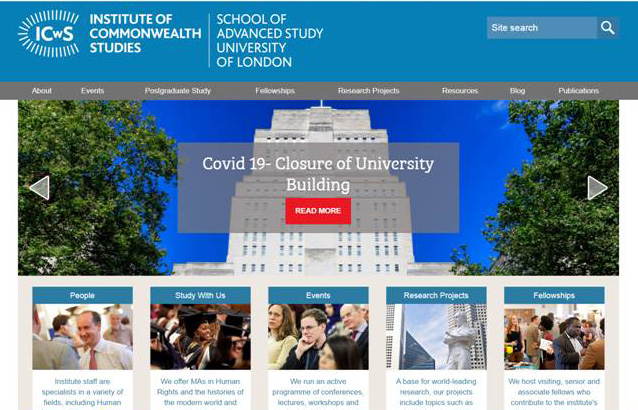
Many of us who are interested in the Commonwealth have been alarmed to learn in the last few days that the School of Advanced Study, University of London, intends to close permanently the world-renowned Institute of Commonwealth Studies (along with the Institute of Latin American Studies, the only other University of London institute focusing in any significant way on the Global South), and to make its key staff redundant.
Victoria Schofield, chair of the editorial board of The Round Table, writes:
Since its foundation in 1949, the University of London’s Institute of Commonwealth Studies has been the key institutional hub in the UK for the study of the Commonwealth, the legacies of empire, and the post-colonial world. Throughout this time it has stood out as a beacon of academic excellence and public engagement, on both a national and an international level, and has had an impact and influence out of proportion to its size and resources.
Recent activities at the institute have included the Commonwealth Oral History Project, an enormously important resource for current and future scholars of post-colonial relationships; teaching for the MAs in Human Rights and Refugee Protection; the hosting of numerous PhD students and visiting scholars, who have benefited from the informed and stimulating interdisciplinary ethos of the institute; public engagement and education on a range of key public issues of current concern; and regular, highly-regarded and well-attended seminars and conferences on decolonisation, imperial legacies, human rights, refugee law, media freedom, and Black British history, among other important topics. The continuing vitality of the institute has been shown clearly during the current Covid-19 lockdown by the proliferation of online courses and conferences masterminded and managed by the institute.
The loss of an institution such as this would diminish not only the University of London but the whole UK and international academic environment. The case for closure, such as it has been made (see https://london.ac.uk/sas-new-strategy), is highly unconvincing either on financial grounds or on grounds of rational re-organisation. There has been no consultation with stakeholders during the formulation of the proposals, and apparently no attempt either to look at alternative funding models or other ways of keeping this valuable institution open. The suggestion that some of the institute’s activities can simply be transferred to other University of London institutes ignores the lack of relevant expertise in those other institutes, the fact that those other institutes have no similar proven track record in interdisciplinary and transnational research, and the painstakingly built and maintained networks and credibility of the Institute of Commonwealth Studies itself.
The intention to close the institute is particularly baffling given the context of a renewed interest in and indeed urgency of questions relating to imperial and colonial legacies both within the UK and around the world, and against the background of the Brexit-induced transformation of the UK’s global interests and engagement, including in relation to the Global South. The intention to close the institute would suggest that the decision-makers at the University of London are advocates of Little England rather than Global Britain.
My colleagues on the editorial board of The Round Table are unanimous in expressing dismay at this regrettable, short-sighted, and ill-considered proposal. We will be compiling a submission to the University of London, in which we will be arguing that the Institute of Commonwealth Studies is more relevant today than it has ever been, and expressing the hope that there is still time for meaningful consultation and re-consideration.
There is a petition against the closure (which also gives the e-mail addresses for any submissions, either for or against the proposed closure) via this link.



